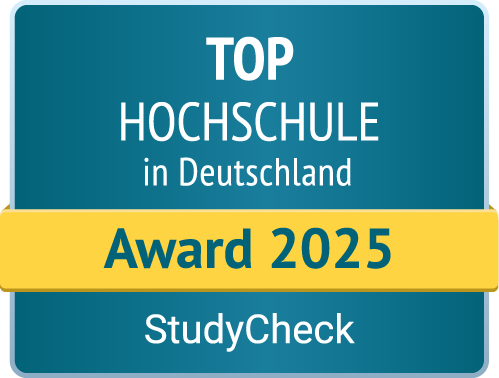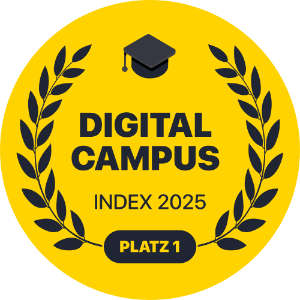Faculty of Engineering
Engineering and Management
(WIN / WIT)
Study overview
The Master "Industrial Engineering" (WIN) is an interdisciplinary course of studies consisting of engineering and economic parts.
The challenges for companies lie in the permanent innovation of existing products and services in order to successfully compete in the global market. For this purpose, it is necessary to combine sophisticated technology with economic thinking. The master's program therefore contains both technical modules (e.g. "Smart Machines" and "Smart Material Scienes") and modules with an economic focus.
Digital transformation is currently a key focus in strategic corporate development. The master's program "Industrial Engineering" provides the necessary skills to actively shape the future.
Graduates of the master's program are able to apply the acquired competencies independently and on their own responsibility in their future professional practice. A wide range of career opportunities open up across all sectors in middle and senior management.
| Short form | WIN / WIT |
| Type of study | Full time / Part time |
| Standard period of study | 3 semester / 6 semesters |
| Award | Master of Engineering (M.Eng.) |
| Start of studies | see Master Smart Industry Management |
| Admission restrictions | specific |
| Lecture location | Ansbach, Rothenburg, Blended Learning |
| Language of instruction | German |
| Course management | Prof. Dr.-Ing. Alexandru Sover |
| Student advisory service | Prof. Dr.-Ing. Alexandru Sover |
| Student Services | studierendenservice.win(at)hs-ansbach.de |
* If you start in the summer semester, you will enter the 2nd semester;
in the following winter semester, you will attend the 1st semester.
Study structure
The Master's programme "Industrial Engineering and Management" comprises 90 ECTS divided into three semesters. There are modules that have a technical or economic focus. A number of courses link the technical aspects with a business perspective.
Individual profiling is possible through elective modules. The extensive team-oriented project work is excellent preparation for later professional life, as a task is structured and worked on independently in cooperation with fellow students. In particular, the topics relevant to companies such as digitalisation (Industry 4.0), artificial intelligence, smart materials and sustainable business will play an important role in the degree programme. For this purpose, several modern laboratories with machines and software are also available to deepen the theoretical topics in a practical environment. The degree programme is completed with a scientific Master's thesis, which is often written in cooperation with an industrial partner. After successful completion of the programme, the internationally recognised academic degree Master of Engineering (M.Eng.) is awarded.
Perspectives
The Master's programme in Industrial Engineering and Management is highly recognised by companies in all sectors. In particular, through the combination of technology and economic know-how, it opens up excellent opportunities to take on leadership responsibility up to top management in the course of one's professional life. This applies to jobs in small and medium-sized companies as well as in internationally operating corporations. The path to research and public administration is also open. Thus, a wide variety of industries are the future field of activity:
- Automotive
- Aircraft industry
- Mechanical engineering / electrical engineering
- Plastics industry
- Chemical, pharmaceutical and food industry
- Research institutions
Career opportunities lie in various company departments such as development, production, sales or management consultancy. For example, the following positions are suitable:
- Business unit management
- (Partial) development management
- Chief Technology Officer (CTO)
- Production management
- Project management
- Management consultancy
Staff

Prof. Dr.-Ing. Alexandru Sover
Studiengangsleiter Master Wirtschaftsingenieurwesen (WIN)
Prof. Dr.-Ing. Alexandru Sover

Studiengangsleiter Master Wirtschaftsingenieurwesen (WIN)
Funktionen:
- Studiengangsleiter Master Wirtschaftsingenieurwesen (WIN) / ab
Wintersemester 2025 Smart Industry Management (SIM) - Forschungsprofessor Intelligente Werkstoffe und ihre Anwendungen
- Professor der Studiengänge WIG, WIN/SIM, NIW, AKT
- Mitglied Fakultätsrat Technik
- Laserschutzbeauftragter der Hochschule Ansbach
Lehrgebiete:
- Werkstofftechnik
- Konstruktion
- Smart Materials
- Kunststofftechnik
- Kunststoffverarbeitung
- Prüftechnik & Analyseverfahren
- Fügetechnik
- Additive Fertigung & DesignBionik in Additive Manufacturing
- Intelligente Werkstoffe
- Kunststoffverarbeitung
- Kunststoffprüfung, -analyse
- Laserbearbeitung
Forschungsfelder:
- Entlackung von Kunststoffbauteilen
- Entschichten von Hybridmaterialien
- Additive Manufacturing (FDM/FFF; SLS, SLA)Produktentwicklung
Labore
- Additive Fertigung
- Laserbearbeitung
- Smart Materials und Kunststoffverarbeitung
- Thermische Analyse
- Werkstofftechnik
Publikationen (Auszug)
- Sover A, Laserentlackung von thermoplastischen Kunststoffen, Fachvortrag am IMCcon 2025 Effizienz trifft auf Brillanz 11./12. März 2025 | Neue Materialien Bayreuth
- Sover A, Zink M, Innovative, environmentally friendly decoating of metallised plastic products using laser technology (2024) Presentation at the 28th Edition of International Conference (IMANEE 2024), Athens Oct. 2024
- Sover A, Zink M, Innovative, environmentally friendly decoating of metallised plastic products using laser technology (2024) The 28th Edition of International Conference (IMANEE 2024) Oct. 2024
- Bănică C-F, Sover A, Anghel D-C. Printing the Future Layer by Layer: A Comprehensive Exploration of Additive Manufacturing in the Era of Industry 4.0. Applied Sciences. 2024; 14(21):9919. https://doi.org/10.3390/app14219919
- Vasile Ermolai, Alexandru Sover, Marius Andrei Boca, Andrei Marius Mihalache, Alexandru Ionuț Irimia, Adelina Hrițuc, Laurențiu Slătineanu, Gheorghe Nagîț, Răzvan Cosmin Stavarache, Mechanical behavior of macroscopic interfaces for 3D printed multi-material samples made of dissimilar materials, Mechanics & Industry 25 24 (2024), https://doi.org/10.1051/meca/2024017
- Sover, A., M-A Boca, Characterisation of the Cooling System Performance of Additively Manufactured Thermoforming Moulds, Conference ICORSEE 2024 (Lecture)
- Boca, MA., Sover, A. (2024). Characterisation of the Cooling System Performance of Additively Manufactured Thermoforming Moulds. In: Cioboată, D.D. (eds) International Conference on Reliable Systems Engineering (ICoRSE) - 2024. ICoRSE 2024. Lecture Notes in Networks and Systems, vol 1129. Springer, Cham. https://doi.org/10.1007/978-3-031-70670-7_2
- Sover, A., Michalak, M., „Klein, aber fein; Wie hochpräzise additive Fertigung gelingt“, https://www.plastverarbeiter.de/verarbeitungsverfahren/wie-hochpraezise-additive-fertigung-gelingt-969.html, Plastverarbeiter 04.2024
- Tekiner I. H., Knoblauch A., Sover A, Häfner P., Muschler A, Tainsa M, Response of Secondary Structural Components of Egg White Proteins to Cold and Thermal Extremities in Water/Deuterium Oxide Mixtures, Carpathian Journal of Food Science and Technology, 2024, 16(1), 198-209, https://doi.org/10.34302/crpjfst/2024.16.1.16
- Annette Martin, Alexandru Sover, FORSCHUNG IN FRANKEN, Zweite Chance für kontaminiertes Plastik?,
- https://www.fraenkischertag.de/region/ansbach/hochschule-ansbach-zweite-chance-fuer-kontaminiertes-laborplastik-art-313319, 01.2024
Weitere Publikationen

Ralph-Peter Kappestein
Leiter Studierendenservice der School of Business and Technology (SBT)
0981 4877-143 BHS 3.02 (Brauhausstraße 15, 91522 Ansbach) nach Vereinbarung ralph-peter.kappestein vCard
Ralph-Peter Kappestein

0981 4877-143
BHS 3.02 (Brauhausstraße 15, 91522 Ansbach)
nach Vereinbarung
ralph-peter.kappestein
vCard
Leiter Studierendenservice der School of Business and Technology (SBT)
Funktionen:
- Leiter Studierendenservice der School of Business and Technology (SBT)

Prof. Dr.-Ing. Jürgen Göhringer
Professor Wirtschaftsingenieurwesen (WIG/WIN)
0981 4877-573 51.1.7 nach Vereinbarung juergen.goehringer vCard
Prof. Dr.-Ing. Jürgen Göhringer

Professor Wirtschaftsingenieurwesen (WIG/WIN)
Funktionen:
Lehrgebiete:
- Automatisierungstechnik
- Digitalisierung in der Industrie
- Manufacturing Execution Systems (MES)
- Angewandte Künstliche Intelligenz
- Industrie 4.0
Forschung und Weiterbildung:
- Digitalisierung, IoT, Digitale Transformation
- Manufacturing Execution Systems, Scheduling
- Strategieentwicklung (Masterplan, KPIs, Scorecard)
Vita:
- Professor, Hochschule Ansbach
- Leiter Strategie, Siemens AG, Digtial Factory
- Leiter Business Development IT,Siemens AG, Digital Factory
- Projektleiter, Leiter Consulting MES, Siemens AG, Software House
- Wissenschaftlicher Assistent, Lehrstuhl FAPS, Universität Erlangen
- Studium Maschinenbau, Universität Erlangen
Publikationen (Auszug):
- Predictive Maintenance und Condition Monitoring für Lötanlagen – KI4Service Cloud, J. Fleischmann, J. Göhringer, A. Neiser, A. Reinhardt, EBL Fellbach 2022, Tagungsband
- Predictive Maintenance mit KI-Methoden zur Produktivitätssteigerung, J. Göhringer, Line-to-Circle Kongress, Ansbach 2021
- Die Digitalisierung treibt MES, FAPS-IPC Fachtagungsband 2017
- Ohne Strategie gibt es keine erfolgreiche Digitalisierung, FAPS-IPC Fachtagungsband 2017
- Systematische Entwicklung und internationaler Roll-out innovativer Dienstleistungen, macrusevans, 2011
- Produktionsoptimierung senkt Kosten, VDI-Z, 2008
- Systematische Entwicklung und internationaler Roll-out eines Dienstleistungsportfolios, Aachener Dienstleistungsforum, RWTH Aachen, 2008
- Handbook of Industrial Engineering, Section Manufacturing and Production Systems, John Wiley & Sons, Inc.; New York, 3rd Edition, 2001

Prof. Dr.-Ing. Simon Hufnagel
Professor Künstliche Intelligenz und Kognitive Systeme (KIK)
Prof. Dr.-Ing. Simon Hufnagel

Professor Künstliche Intelligenz und Kognitive Systeme (KIK)
Funktionen
- Studiengangleiter Künstliche Intelligenz und Kognitive Systeme (KIK)
- Praktikumsbeauftragter Künstliche Intelligenz und Kognitive Systeme (KIK)
- Professor Wirtschaftsingenieurwesen (WIG)
- Professor Wirtschaftsingenieurwesen (WIN/WIT)
- AN[ki]T Koordinator Fakultät Technik
Lehrgebiete
- Technische Informatik
- Embedded Systems
- Programmieren 1 / 2
- Informationsmanagement
- Anwendung von Datenbanksystemen
Forschungsgebiete
- Ereignisdiskrete Simulation
- Embedded AI
Vita
2005–2010: kombiniertes Studium
Dipl.-Ing. (FH) Elektro- und Informationstechnik (Georg-Simon-Ohm Hochschule Nürnberg)
IHK Ausbildung zum Elektroniker für Automatisierungstechnik (Robert Bosch GmbH)
2010–2013: Industrie Promotion im Bereich Simulation digitaler Hardware (zentrale Forschung und Vorausentwicklung der Robert Bosch GmbH in Kooperation mit TU Kaiserslautern)
2013–2016: Forschungsingenieur für funktionale Sicherheit und Zuverlässigkeit elektronischer Systeme, Schwerpunkt Hardwarenahe Software (Robert Bosch GmbH)
2016–2017: Projektleiter Simulationsplattform eines elektronischen Steuergeräts für hochautomatisiertes Fahren (Robert Bosch GmbH)
2017–2018: Teamleiter Embedded Softwareentwicklung Produktbereich Wasser- und Wärmemengenzähler (Diehl Metering GmbH)
2018–2021: Spezialist für Fertigungsleittechnik, Produktionsdatenverarbeitung und Industrie 4.0 (Robert Bosch GmbH)
Seit 2021: Professor für technische Informatik und Embedded Systems (Hochschule Ansbach)

Prof. Dr.-Ing. Thomas Müller-Lenhardt
Studiengangsleiter Angewandte Kunststofftechnik (AKT)
09141 874669-305 51.2.20 nach Vereinbarung t.mueller-lenhardt vCard
Prof. Dr.-Ing. Thomas Müller-Lenhardt

Studiengangsleiter Angewandte Kunststofftechnik (AKT)
Funktionen:
- Professor für Kunststofftechnik
- Studiengangsleiter Angewandte Kunststofftechnik (AKT)
- Vorsitzender Prüfungskommission Angewandte Kunststofftechnik
- Professor Nachhaltige Ingenieurwissenschaften (NIW)
- Stellvertretender wissenschaftlicher Leiter Studienzentrum „kunststoffcampus bayern“ Weißenburg (WUG)
Lehrgebiete:
- Analyseverfahren
- Werkstoffkunde
- Kunststofftechnik
- Kunststoffverarbeitung
- Spezielle Verarbeitungstechnik
- Prüftechnik
- Verbindungstechnik
- Entwicklungsstrategien
- Faserverbundkunststoffe

Prof. Dr. Torsten Schmidt
Professor Wirtschaftsingenieurwesen (WIN)
0981 4877-262 51.1.5 nach Vereinbarung torsten.schmidt vCard
Prof. Dr. Torsten Schmidt

Professor Wirtschaftsingenieurwesen (WIN)
Funktionen:
- Professor Künstliche Intelligenz und Kognitive Systeme (KIK)
- Mitglied Fakultätsrat Technik
- Beauftragter für Studierende mit Behinderung und chronischen Erkrankungen
Lehrgebiete:
- Künstliche Intelligenz / Maschinelles Lernen
- Zeitreihenprädiktion
- Deep Medicine
- Automatisierungstechnik
- Mathematik 1 / 2
- Physik 1 / 2
Forschungsgebiete:
- Zeitreihenprädiktion und deren Anwendungen
- Effektive Lernalgorithmen für kleine Datenmengen
- Multiphysikalische Greybox-Modelle und Algorithmen
- Theoretische Grundlagen des Quantencomputing
© 2025 Hochschule Ansbach


